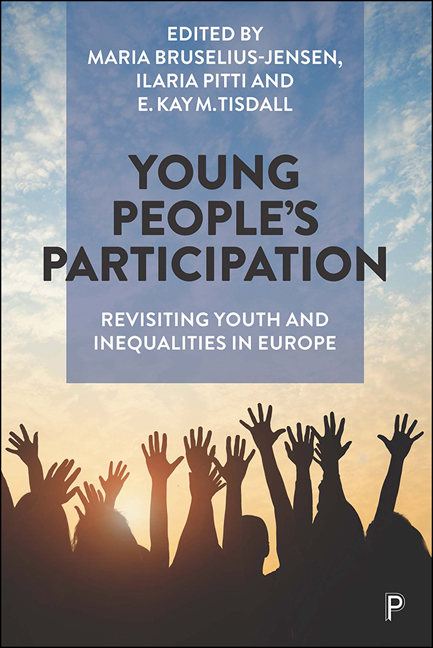Book contents
- Frontmatter
- Contents
- List of figures and tables
- Notes on contributors
- Acknowledgements
- 1 Revisiting young people's participation: an introduction
- PART I Young people's experiences of participation and engagement
- PART II Current state and conditions for young people’s participation: critiques and trends
- PART III Broadening participation: young people's own approaches to participation
- PART IV New opportunities for young people's participation: facilitating new forms of youth participation
- Index
2 - Cultural activism against inequalities: the experience of Quaderni Urbani in Bologna
Published online by Cambridge University Press: 18 December 2021
- Frontmatter
- Contents
- List of figures and tables
- Notes on contributors
- Acknowledgements
- 1 Revisiting young people's participation: an introduction
- PART I Young people's experiences of participation and engagement
- PART II Current state and conditions for young people’s participation: critiques and trends
- PART III Broadening participation: young people's own approaches to participation
- PART IV New opportunities for young people's participation: facilitating new forms of youth participation
- Index
Summary
Project history
How can an individual play a part in changing the existing order of things? This was the very simple question that, as a young Italian university student, I asked myself, in the years when an unprecedented economic crisis affected the most vulnerable strata of the economy of my country, showing its effects in terms of poverty, social marginality and socio-cultural disorientation. My generation has been named the ‘generation of the crisis’: a cohort psychologically scarred by precariousness experienced as an existential condition and yet aware of having been deviously deprived of the right to freely imagine its own future. The frustration with the institutions that enacted the austerity measures of ‘tears and blood’ that exasperated misery and inequality led many of us to experience feelings of surrender and passivity. However, among others it also stimulated new desires for direct intervention in the emerging social problems and the development of a political conscience no longer supported by ideologies and party structures. Starting from this critical awareness about the present in which I lived, I began to feel a burning need for commitment and the need to practically enact my convictions by going beyond the purely theoretical terrain of my studies. At first, I started to volunteer in some reception centres for migrants, homeless people, drug users and other marginalised groups run by the municipality of Bologna. However, it was only when I met the political collective of Labàs that I found a space of engagement that was compatible with my idea of participation. In Labàs, it was for me finally possible to reconcile my ideas about what political engagement should be with practical actions.
Labàs was born in 2012 from the occupation of a former military barracks that the activists tried to save from degradation and turn into an ‘urban commons’. Within the barracks the political collective had set up a self-managed social shelter for migrants. In an environment ‘immunised’ from any form of racial, religious or cultural discrimination, migrants and asylum seekers were directly involved in the management of the shelter and supported in their strenuous process of social integration.
- Type
- Chapter
- Information
- Young People's ParticipationRevisiting Youth and Inequalities in Europe, pp. 17 - 28Publisher: Bristol University PressPrint publication year: 2021

